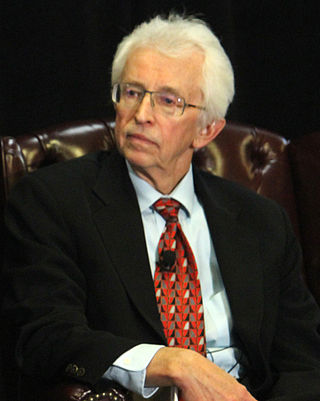
The Treaty on the Non-Proliferation of Nuclear Weapons, commonly known as the Non-Proliferation Treaty or NPT, is an international treaty whose objective is to prevent the spread of nuclear weapons and weapons technology, to promote cooperation in the peaceful uses of nuclear energy, and to further the goal of achieving nuclear disarmament and general and complete disarmament. Between 1965 and 1968, the treaty was negotiated by the Eighteen Nation Committee on Disarmament, a United Nations-sponsored organization based in Geneva, Switzerland.

Stephen Anthony Cambone was the first United States Under Secretary of Defense for Intelligence, a post created in March 2003. Cambone first came to the attention of the public at large during the testimony of Major General Antonio Taguba before the U.S. Senate Armed Services Committee, where he disputed the General's statement that prison guards were under the effective control of military intelligence personnel and interrogators. Cambone resigned at the beginning of 2007 and was replaced by James R. Clapper, Jr., former head of the Defense Intelligence Agency (DIA) and the National Geospatial-Intelligence Agency. Cambone was associated with the Project for the New American Century, participating in the study which resulted in the writing of the report Rebuilding America's Defenses.
Iran has research sites, two uranium mines, a research reactor, and uranium processing facilities that include three known uranium enrichment plants.

The Bureau of Intelligence and Research (INR) is an intelligence agency in the United States Department of State. Its central mission is to provide all-source intelligence and analysis in support of U.S. diplomacy and foreign policy. INR is the oldest civilian element of the U.S. Intelligence Community and among the smallest, with roughly 300 personnel. Though lacking the resources and technology of other U.S. intelligence agencies, it is "one of the most highly regarded" for the quality of its work.

The Senate Report on Iraqi WMD Intelligence was the report by the United States Senate Select Committee on Intelligence concerning the U.S. intelligence community's assessments of Iraq during the time leading up to the 2003 invasion of Iraq. The report, which was released on July 9, 2004, identified numerous failures in the intelligence-gathering and -analysis process. The report found that these failures led to the creation of inaccurate materials that misled both government policy makers and the American public.

The Niger uranium forgeries were forged documents initially released in 2001 by SISMI, which seem to depict an attempt made by Saddam Hussein in Iraq to purchase yellowcake uranium powder from Niger during the Iraq disarmament crisis. On the basis of these documents and other indicators, the governments of the United States and the United Kingdom asserted that Iraq violated United Nations sanctions against Iraq by attempting to procure nuclear material for the purpose of creating weapons of mass destruction.

Iran is not known to currently possess weapons of mass destruction (WMD) and has signed treaties repudiating the possession of WMD including the Biological Weapons Convention, the Chemical Weapons Convention, and the Non-Proliferation Treaty (NPT). Iran has first-hand knowledge of WMD effects—over 100,000 Iranian troops and civilians were victims of chemical weapons during the 1980s Iran–Iraq War.
National Intelligence Estimates (NIEs) are United States federal government documents that are the authoritative assessment of the Director of National Intelligence (DNI) on intelligence related to a particular national security issue. NIEs are produced by the National Intelligence Council and express the coordinated judgments of the United States Intelligence Community, the group of 18 U.S. intelligence agencies. NIEs are classified documents prepared for policymakers.
Walter Haskell Pincus is an American national security journalist. He reported for The Washington Post until the end of 2015. He has won several prizes including a Polk Award in 1977, a television Emmy in 1981, and shared a 2002 Pulitzer Prize for National Reporting with five other Washington Post reporters, and the 2010 Arthur Ross Media Award from the American Academy for Diplomacy. Since 2003, he has taught at Stanford University's Stanford in Washington program.

Siegfried S. Hecker is an American metallurgist and nuclear scientist. He served as Director of the Los Alamos National Laboratory from 1986 to 1997 and is now affiliated with Stanford University, where he is research professor emeritus in the Department of Management Science and Engineering in the School of Engineering, and senior fellow emeritus at the Freeman Spogli Institute for International Studies. During this time, he was also elected a member of the National Academy of Engineering (1988) for outstanding research on plutonium and the forming of materials, and for leadership in developing energy and weapons systems.

Anthony H. Cordesman was an American national security analyst. He held the Arleigh A. Burke Chair in Strategy at the Center for Strategic and International Studies (CSIS) and was a national security analyst on a number of global conflicts.

Henry D. Sokolski is the founder and executive director of the Nonproliferation Policy Education Center, a Washington, D.C.–based think tank promoting a better understanding of strategic weapons proliferation issues among policymakers, scholars, and the media. He teaches as an adjunct professor at The Institute of World Politics in Washington, D.C., and at the University of Utah and has an appointment as senior fellow for nuclear security studies at the University of California at San Diego's School of Global Policy and Strategy.
This is the timeline of the nuclear program of Iran.

Saudi Arabia is not known to have a nuclear weapons program. From an official and public standpoint, Saudi Arabia has been an opponent of nuclear weapons in the Middle East, having signed the Treaty on the Non-Proliferation of Nuclear Weapons, and is a member of the coalition of countries demanding a Nuclear-weapon-free zone in the Middle East. Studies of nuclear proliferation have not identified Saudi Arabia as a country of concern. Nuclear technology company IP3 International was formed in June 2016 to transfer nuclear technology from the United States to Saudi Arabia.
This article deals with activities of the U.S. Central Intelligence Agency, specifically dealing with arms control, weapons of mass destruction (WMD) and weapons proliferation. It attempts to look at the process of tasking and analyzing, rather than the problem itself, other than whether the CIA's efforts match its legal mandate or assists in treaty compliance. In some cases, the details of a country's programs are introduced because they present a problem in analysis. For example, if Country X's policymakers truly believe in certain history that may not actually be factual, an analyst trying to understand Country X's policymakers needs to be able to understand their approach to an issue.

Paula Adamo DeSutter was United States Assistant Secretary of State for Verification, Compliance, and Implementation from 2002 to 2009.
Views on the nuclear program of Iran vary greatly, as the nuclear program of Iran is a very contentious geopolitical issue. Uriel Abulof identifies five possible rationales behind Iran’s nuclear policy: (i) Economy, mainly energy needs; (ii) Identity politics, pride and prestige; (iii) Deterrence of foreign intervention; (iv) Compellence to boost regional influence; and (v) Domestic politics, mitigating, through 'nuclear diversion' the regime’s domestic crisis of legitimacy. Below are considerations of the Iranian nuclear program from various perspectives.
Jeffrey Lewis is an American expert in nuclear nonproliferation and geopolitics, currently a professor at the James Martin Center for Nonproliferation Studies at the Middlebury Institute of International Studies at Monterey, and director of the CNS East Asia Nonproliferation Program. He has written two books on China's nuclear weapons, and numerous journal and magazine articles, blog posts, and podcasts on nonproliferation and related topics.
Vann Van Diepen is a former United States civil servant who worked in a variety of positions in the United States Department of State.
Kathleen Cordelia Bailey is an American political scientist and artist. She served as deputy assistant secretary of the Bureau of Intelligence and Research and as assistant director of the Arms Control and Disarmament Agency. She is a senior associate at the National Institute for Public Policy in Washington, D.C.











